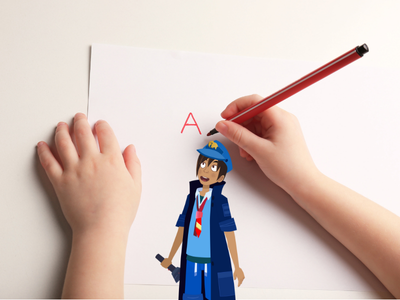Why is Writing Important for Children?


Writing is a critical life skill for any human. The majority of us write every single day - be it typing a text, creating a to-do-list, or filling out a form. In educational terms, writing is one of the four main literacy skills children begin learning as preschoolers, alongside listening, reading, and speaking. What’s amazing is that by practicing one of these skills, children naturally strengthen the others!
In today’s digital world, where technology AI play a growing role in communication and learning, writing is more important than ever. While AI tools can help with grammar checks or idea generation, children still need strong foundational writing skills to think critically, express themselves clearly, and to be able to use these tools responsibly if they're required to.

Introducing writing to your child from an early age has countless benefits, from fostering language skills, to aiding their social and emotional development. Let's dig into them!
1. Communication Skills
By turning thoughts into words, young writers practice expressing their ideas, emotions, and needs clearly. Writing helps children communicate effectively, which is a skill that’s vital in both school and everyday life. In an age when digital messages often replace face-to-face conversations, strong writing skills help ensure your child’s voice is heard and understood.
2. Vocabulary Building
When children write, they must choose the most appropriate words to properly convey their message. This process strengthens their vocabulary and prompts children to learn new words to help communicate their ideas.
3. Reading-Writing Connection
There is a strong connection between writing and reading skills. As children write more, they incorporate and reinforce the words, ideas, and sentence structures they’ve encountered in books. This strengthens reading comprehension and overall literacy, ultimately helping them become confident and capable learners.
4. Self Expression
Writing gives children a safe space to express their thoughts, explore emotions, and reflect on experiences. It’s a wonderful way for young writers to discover who they are and build self-awareness. In a world where much of children’s communication happens online, writing offers a grounding, personal outlet for creativity and introspection.

5. Grammatical Abilities
Writing allows children to practice grammatical concepts such as punctuation, verb tense usage, and sentence construction. These practical applications help grammar “stick” in a way that worksheets alone can’t. Reinforcing grammar rules through hands-on writing is essential as even though AI and spellcheck tools can automatically correct mistakes, understanding why something is written a certain way helps children become more confident, independent writers.
6. Handwriting
While much writing is now done as typing, handwriting is still an important skill to learn. Handwriting improves fine motor skills, meaning the small muscles in the hands will work with the brain and nervous system to better control movements. The more control young writers have over the muscles in their hands, the better their handwriting skills! The more handwriting practice, the better!
7. Preparation for the future
Strong writing skills open doors - academically, professionally, and personally. From essays and reports to job applications and emails, the ability to write clearly and persuasively remains a highly valued skill. As AI continues to shape the future workplace, those who can combine critical thinking with effective writing will stand out as strong communicators and leaders.
So how do I get my kid to write?
After all of this talk about the benefits of writing, you’re probably wondering how you can encourage your child to write more. Fear not! We’ve got you covered.
Here’s how you can encourage your child to practice their writing skills:
1. Start Early
We recommend that children begin writing around 3 or 4 years of age. Get them writing as early as possible to give them a head start on their writing skills.
The earlier your child begins to write, the more confidence they will build. Naturally, writing will become easier and more enjoyable as time goes on.
2. Fun Writing Projects
Formal writing and worksheets aren’t the only ways to get writing practice in! Try giving your child creative writing activities that they will enjoy. Writing letters to family members, writing stories, and fun writing prompts can help motivate them to write.
3. Try Night Zookeeper

Night Zookeeper is a unique writing program that makes writing fun for your child! Developed by teachers, the program uses a gamified approach to help your child improve all aspects of writing, including spelling, grammar, punctuation, and vocabulary.
Sign up today and get a FREE 7-day trial!
Got any questions? Reach out to us via email at support@nightzookeeper.com. Follow us on social media for more tips, advice and freebies:


Make Reading & Writing Fantastically Fun!
- Award-winning reading & writing program for kids
- Improves spelling, grammar, punctuation & vocabulary
- Over 1,000 different learning games and activities


Why Is Reading Important For Children?


“My child hates writing.” What do I do?


Why Spelling is Important for Children


